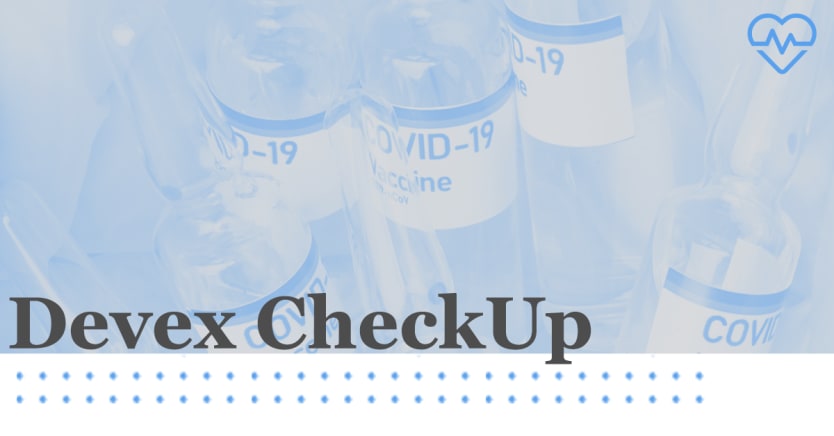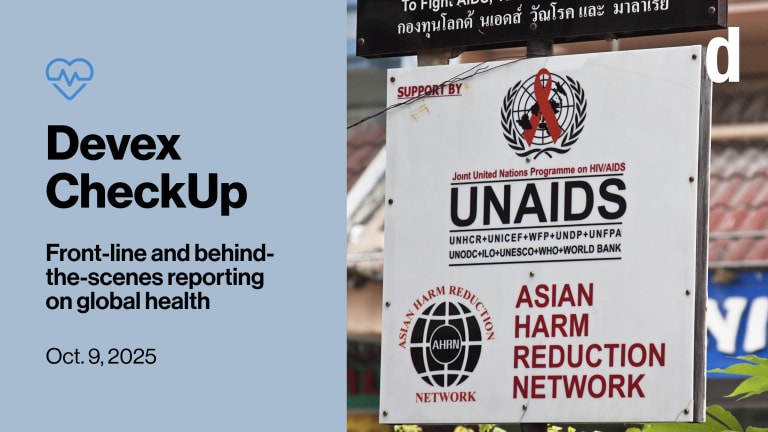
The European Commission is setting up a new body: the European Health Emergency Preparedness and Response Authority, or HERA — “just like the queen of Greek gods,” commission President Ursula von der Leyen said in December. Tasked with leading the European Union’s response to the next health emergency, HERA is the latest addition to a growing list of hubs and institutions aimed at preparing for future crises.
This is a preview of Devex CheckUp
Sign up to this newsletter for exclusive global health news and insider insights, in your inbox every Thursday.
• The new authority is expected to be operational in early 2022. In a State of the Union speech Wednesday, von der Leyen called HERA “a huge asset to deal with future health threats earlier and better” and proposed “a new health preparedness and resilience mission for the whole of the EU” with €50 billion ($59.1 billion) in investment by 2027.
• According to EURACTIV, HERA will oversee the development, manufacturing, procurement, and distribution of medical products such as vaccines and therapeutics, among others.
• Previously, von der Leyen has said that HERA will be the EU’s “main tool of foresight and foreplanning” and that it will work with “all relevant players” — such as startups, civil society organizations, NGOs, and multinational companies — to ensure Europe can “quickly develop and deploy the solutions to the next health crisis.”
• The Pan-European Commission on Health and Sustainable Development also recently recommended the creation of a global health board, a Pan-European network for disease control, and a Pan-European health threats council.
Read: Commission pushes global health board, resists WHO-FAO merger
Learn more: EU moves to boost pandemic preparedness, counter Chinese investments
ICYMI: Can the new WHO hub in Berlin build trust for data sharing?
Where there’s smoke
To maintain a hold over African markets, British American Tobacco allegedly spent over $600,000 in “questionable payments” to government officials and others across 10 countries to disrupt the operations of competitors and sway national policies, according to reports published by an industry watchdog, Sara Jerving reports.
The findings, based on investigation by the Tobacco Control Research Group at the University of Bath, the Bureau of Investigative Journalism and the BBC’s “Panorama,” also indicated the company was involved in “potentially unlawful surveillance” in South Africa. In 2016, WHO estimated that about 146,000 Africans over 30 years of age die every year from tobacco-related illnesses.
One big number
$6.41 billion
—That’s how much donors in the Organisation for Economic Co-operation and Development’s Development Assistance Committee disbursed in aid for sexual and reproductive health and rights in 2019, according to a new report by the NGO Deutsche Stiftung Weltbevölkerung.
Opportunity in a crisis
The COVID-19 pandemic has made finding and treating people with tuberculosis more difficult. In the Philippine capital of Manila, the number of registered TB patients fell to 5,463 in 2020, down from 14,141 in 2019.
But as I’ve found out, the problem may also be the solution. When the city launched a COVID-19 testing initiative for market vendors, its TB control team also set up chest X-rays and sputum collection for TB screening and diagnosis.
Read: How Manila uses its COVID-19 response to find TB patients
Intervention interrupted
Your next job?
Senior Director, Program Development — Global Health
Save the Children USA
Remote
The Global AIDS Interfaith Alliance runs mobile health clinics aimed at reaching villagers who live far from health facilities in Malawi, but COVID-19 restrictions have forced the group to scale back some of its activities. Health workers worry that this may reverse gains made against HIV and other health issues in remote parts of the country, Madalitso Wills Kateta reports.
Read: Malawi COVID-19 restrictions threaten interfaith mobile clinic gains
An unsettling prospect
“We face the very real risk that in the future, wealthy countries and communities will begin treating COVID-19 as yet another disease of poverty.”
— Bill Gates, co-chair, Bill & Melinda Gates FoundationAbout 2% of people in low-income countries have received at least one dose of a COVID-19 vaccine, according to figures from Our World in Data.
In Africa — where less than 4% of the population is fully vaccinated — the delta variant has led officials to raise the continent’s immunization target to 70%. According to one estimate, this will require an additional $300 million for doses and up to $600 million for booster shots, along with lifting export bans on vaccine ingredients so the African Union can boost purchases.
Read: Gates Foundation pushes vaccine investment as COVID-19 derails SDGs
What we’re reading
Using domestically developed COVID-19 vaccines, Cuba will start vaccinating children as young as 2 years old — the first country in the world to do so. [The New York Times]
WHO has landed its first shipment of medical supplies in Kabul since the Taliban’s takeover of Afghanistan. [Devex]
Ebola survivors can relapse and trigger outbreaks 5 years after infection, according to new research published in Nature. [France 24]

[image-link-to: https://www.devex.com/newsletters/devex-checkup?utm_medium=footer&utm_source=article_newsletter&utm_campaign=devex_checkup]








